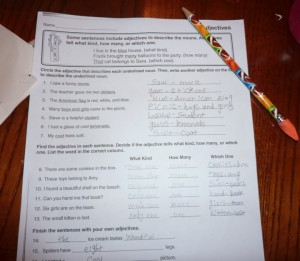How to Handle Homework Hassles

Today’s post is written by guest blogger Laurie Wallin. She tackles an issue near and dear to many parents of kids with special behavioral needs. Here’s what she has to say about…
Homework Hassles and Other Stinky Crud
You know those moments in life when things get so frustrating—almost to absurdity—that you just have to make a change? You try to ignore it. To work around it. To gracefully weasel out of it. But no such luck! It’s like the stinky crud that sometimes colonizes our pantries. You’re not sure where it came from, but you can’t move on with life until it’s dealt with!
I’m in the middle of one of these moments right now with my oldest daughter. For the past 3 years, homework has been our stinky pantry crud. Her learning disabilities, ADHD, bipolar, left-handedness, star sign, and the presence of small shiny objects anywhere in view make it impossible to just sit down and do work without a debacle.
The new and improved version this school year included more homework… and a LOT more attitude! So I finally decided to clean out our stinky pantry.
I gave my daughter FULL responsibility for her homework. The idea came from John Rosemond’s Ending the Homework Hassle (Andrews and McMeel, 1990). Here are the basics for all parents out there struggling with this issue:
A = All by Myself
The child is completely responsible for their homework once they are at an age they can handle it (i.e. older than K-2nd grade). We provide the necessary materials, desk, and lighting. Other than that, they need to do work on their own, away from the main traffic of the family.
B = Back Off
Parents are available for the child to help explain directions or give strategies when they’re stuck on a problem. But other than that, we keep out of it. We don’t sit and do every problem with our kids. And at the end, we can recommend going back over problems done incorrectly, but not do the work for them.
C = Call It Quits at a Reasonable Hour
This one is extra applicable to us, since my kiddo has ADHD and often loses her own train of thought in the middle of a sentence. This means a 20-minute assignment can take hours. IEP’s and shortened homework accommodations aside, we have to set the timer for a reasonable amount of time and stick with that boundary.
You know what? After 3 days, she’s coming home, getting her bag, going upstairs, doing every problem on her homework assignments, and putting it in her bag without me reminding her at all.
And it’s not covered in scribbles. Or crumpled in a ball. Or incomplete. Or making me want to run for the hills.
Do you see this picture? It looks wonderful! Too bad EVERY problem is incorrect.
So for a child with delays, adoption attachment issues, a mood disorder, and attentional issues, is it better for her to struggle with me over homework every day for hours? Or to let her fail, but relate peacefully with her after school?
I guess that’s my next stinky issue…
How Do You Handle Homework Hassles and Other Stinky Crud?
If you have suggestions about how to handle homework hassles, please leave a comment. Or if you have a question for Laurie, leave that, too.
Do you like what you see at DifferentDream.com? You can receive more great content by subscribing to the quarterly Different Dream newsletter and signing up for the daily RSS feed delivered to your email inbox. You can sign up for the first in the pop-up box and the second at the bottom of this page.
By Laurie Wallin
Laurie is the mom of four daughters–two adopted with developmental delays, mood disorders, and ADHD. A former junior high teacher turned speaker and life coach, she loves to learn, laugh until their sides hurt, and help women be courageous in life.
Subscribe for Updates from Jolene
Related Posts
Why Did God Make Me this Way?
Guest blogger Steve Siler tells the story of his answer to his son’s question: “Why did God make me this way?”
Can Churches Help Families Raising Children with Disabilities Stay Together?
Can churches help families raising children with disabilities stay together? Guest blogger Mark Arnold explains his opinion.
The Physical Manifestations of Grief in Caregivers
Jolene explains how the heaviness of loss and sorrow can contribute to the physical manifestations of grief in caregivers.







0 Comments